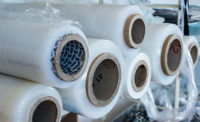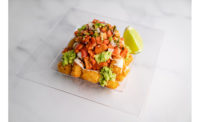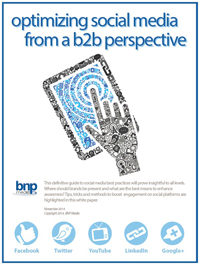Building a Better Box
Boxes used to transport meat and poultry must maintain the integrity and safety of these products throughout the entire distribution chain.
Few materials are as important in distributing meat and poultry as the containers used to transport food products. Choosing boxes that can adequately safeguard products is crucial if packers and processors are to minimize their losses while enhancing customer retention.
In response to an increasing demand for containers that provide added strength and resiliency, manufacturers of corrugated boxes — which are used in distributing more than 95 percent of meat and poultry shipments — are releasing products with heightened damage- and moisture-resistant qualities. One leading supplier, Atlanta-based Georgia-Pacific Co., recently developed a recyclable coating that is intended to substitute non-recyclable waxes.
Box ‘Specifics’
Corrugated boxes consist of flat facings called liners, and wavy, fluted paper in between the liners. When the box is placed on its end, the flutes form rigid columns, and the space between the flutes act as cushions to protect the box’s contents. Corrugated cardboard contains flutes of varying sizes and thickness, and the boxes can be cut into a wide variety of shapes and sizes to provide different degrees of protection.
The primary alternative to corrugated boxes for transporting meat and poultry is plastic containers. But few companies employ that material because of the costs involved in cleaning the plastic and returning the containers to the processing plants following shipments, analysts say. Most corrugated boxes are transferred to recycling centers by the end user.
Indeed, it was retailer interest in recycling that spurred Georgia-Pacific to develop its Greenshield coating technology. Greenshield enables boxes to withstand cold, wet, and humid environments, and — unlike traditional wax-coated corrugated boxes — also can be sold to recycling centers, says Ken Smith, Georgia-Pacific director of retail packaging solutions.
Instead of having to pay fees of about $60 a ton to dispose of wax-coated corrugated boxes, retailers and other end users now can receive approximately $90 a ton for their boxes with the Greenshield coatings, he notes. While Smith says Greenfield is “a bit more” expensive than wax, he adds that the ability to recycle the material lowers users’ overall costs.
The technology is primarily targeted at shippers of controlled vacuum-packed poultry. It was tested last year with an unidentified major processor and retailer during the distribution of more than 2 million pounds of deli chicken.
“It is important to have protection inside the box in case there is residual water or leakage in the bag,” Smith says. “A dry box used without coatings in a wet environment will suck up the moisture and lose its structural integrity.”
Processor demand for moisture-proof packaging also led Norcross, GA-based Rock-Tenn Co. to begin adding its newly devised coatings to the company’s line of corrugated designs. These boxes primarily are used for hamburger patties to retail customers including Publix Super Markets, Kroger, and Costco. Processors and retailers needed a solution that prevents meat juices from penetrating the cardboard, says Tim Markham, vice president of sales for Rock-Tenn’s corrugated division.
“We’re putting a lot of protection on the boxes because it is crucial to keep the container’s strength during transport and in a freezer or a wet environment,” he adds.
The increasing popularity of case-ready meats also is resulting in more robust boxes. Because case-ready containers are displayed in store refrigeration units and freezers, they must be impact-resistant to remain visually appealing to consumers, says Jack McClure, meat and poultry design systems manager for Tacoma, WA-based Weyerhaeuser, a leading corrugated box manufacturer.
Boxes transporting case-ready products, thus, typically are one-third stronger than containers holding other types of cuts, notes Jeff Turner, Weyerhaeuser general sales manager for meat and poultry.
Most processors initially ship case-ready products in basic, regular-slotted containers. But as volume increases, they often invest in machine-formed boxes that are constructed with mechanical packaging systems. The systems are able to cut and fold boxes into designs with stronger corners, and the boxes also consist of less paper.
Such manufacturing technologies are expected to become increasingly sophisticated over the next several years and will result in the further release of more resilient and lower-priced boxes, Turner projects.
“There must be a lot of stability in the box because the processor doesn’t have control over the container when it leaves the plant,” says Pete Stamberg, vice president of production and plant manager for Malcolm Meats, a Northwood, OH-based processor of portion-controlled steaks. “Some of our products pass through five hands before the meat is actually taken out of the box. The boxes can be dropped out of a truck or thrown into a cooler, so it’s important to have a high degree of durability.”
Malcolm Meats’ primary customers include hotels, restaurants, schools, and nursing homes. Because the company vacuum packs its products, Stamberg says he is more concerned with box sturdiness than moisture-resistant enhancements.
But processors’ unceasing desire for more efficient and effective distribution systems that guarantee product integrity during shipment will lead to continual advancements in corrugated box coatings and designs, analysts say.
“Companies are always looking at modifying their practices to improve performance and drive down some of the box production costs,” adds Brian O’Banion, vice president at the Rolling Meadows, IL-based Fibre Box Association, the trade group for corrugated box manufacturers.
Richard Mitchell is a Chicago-area freelance writer.
Technology sources in this article include:
• Georgia-Pacific Corp., phone (404) 652-4188, fax (404) 654-4780, e-mail mjfligg@gapac.com, or visit www.gapac.com
• Rock-Tenn Co., phone (770) 448-2193, fa: (678) 291-7666, e-mail webmaster@rocktenn.com, or visit www.rocktenn.com
• Weyerhaeuser, phone (402) 592-6231 or (402) 597-5465, fax (402) 592-6247, e-mail: www.jeff.turner@weyerhaeuser.com, or visit www.weyerhaeuser.com
• Rock-Tenn Co., phone (770) 448-2193, fa: (678) 291-7666, e-mail webmaster@rocktenn.com, or visit www.rocktenn.com
• Weyerhaeuser, phone (402) 592-6231 or (402) 597-5465, fax (402) 592-6247, e-mail: www.jeff.turner@weyerhaeuser.com, or visit www.weyerhaeuser.com




